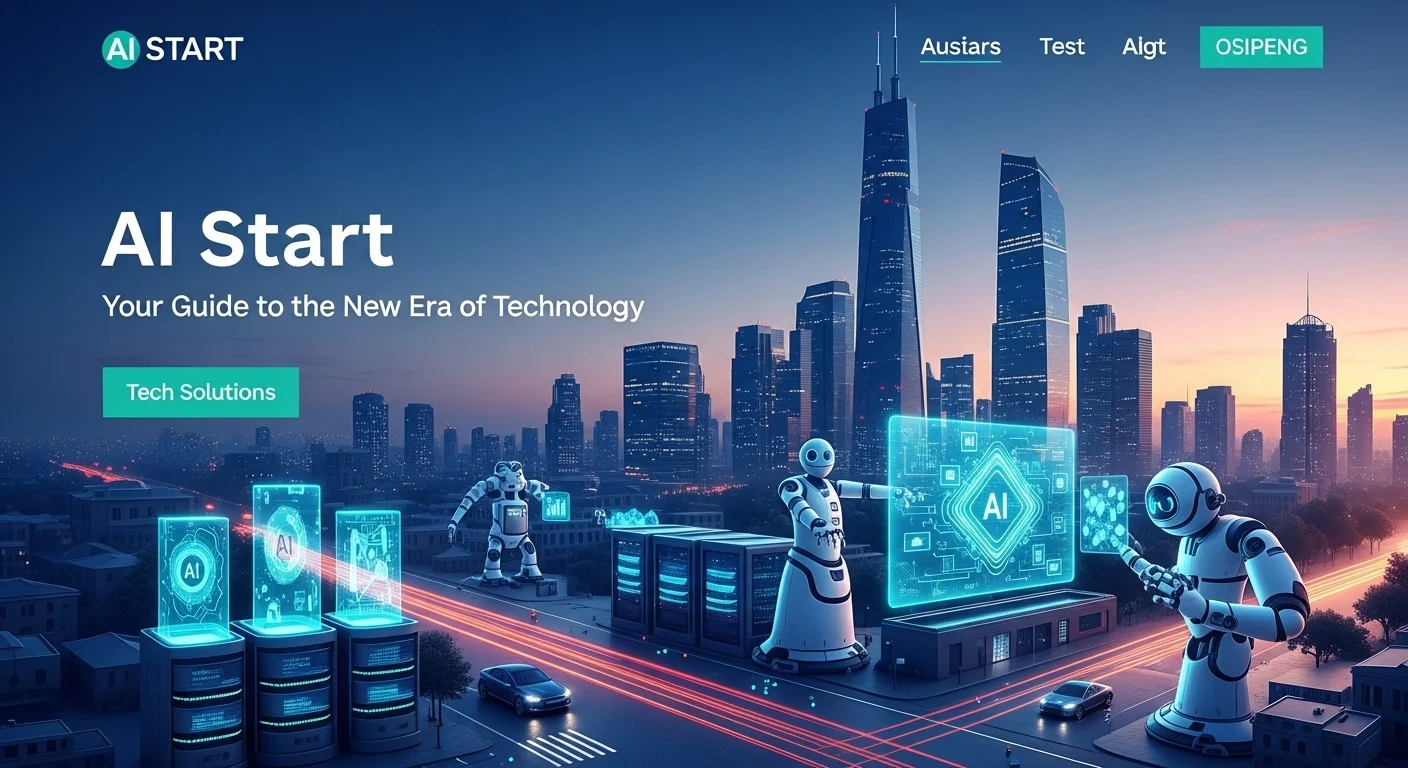Beyond the Hype: Real Tech Business Ideas to Launch in 2025

Executive Summary
As we get closer to 2025, I see the intersection of technology and business buzzing with more potential than ever before. I've been in this space for a long time, and I can tell you, this isn't just another wave of hype. This is a fundamental shift. This article is my personal guide for anyone with an entrepreneurial spark—whether you're a seasoned pro or just dreaming of starting something from your home office. We'll cut through the noise and look at the real opportunities in areas I'm passionate about: Artificial Intelligence, cybersecurity, cloud computing, and sustainable tech. The world is changing fast, and understanding these changes is the key to launching a business that doesn't just survive, but thrives. My goal here is to give you more than just a list of ideas; I want to show you the market potential, the first steps to take, and how you can turn these concepts into a profitable reality. Let's explore what the future of business looks like.
Table of Contents
Table of Contents
- What Are 2025 Business Ideas and Why Do They Matter?
- A Practical Guide to Tech Business Ideas for 2025
- Tips and Strategies for Your Tech Venture
What Are 2025 Business Ideas and Why Do They Matter in Technology?
When I talk about 'Business Ideas for 2025,' I'm not gazing into a crystal ball. It’s about looking at the tracks technology is leaving today to see where the road is heading tomorrow. It's about spotting the ventures that are set up for success based on the tech and social trends that are already in motion. In the world of technology, this forward-looking mindset is everything. I’ve seen technologies go from a sci-fi dream to a daily tool in just a few years. To build a successful business for 2025, you have to understand the engines driving this change: the maturity of Artificial Intelligence (AI), the absolute necessity of the cloud, the critical importance of cybersecurity, and the growing demand for sustainable, green tech. For an entrepreneur, thinking this way is how you find 'blue oceans'—new markets where you can write the rules instead of fighting in a crowded space. For existing companies, it's about innovating to stay relevant. The best business ideas are born from solving real-world problems with modern tools. For instance, as AI becomes easier to access, a huge opportunity opens up for startups to offer AI-powered services to smaller companies that can't afford a dedicated in-house team.
One of the biggest shifts I've witnessed is the explosion of remote work, which has made starting a business from home more practical than ever. The overhead is low, you can hire talent from anywhere in the world, and the tools for collaboration are incredible. Many of the most promising ideas for 2025, like developing a niche Software-as-a-Service (SaaS) product or offering specialized cybersecurity consulting, can be launched from a spare room. This really levels the playing field. The trick is to find a genuine need in a growing market. Think about the creator economy; it has paved the way for businesses that build tools for creators, like AI-powered video editors. These ideas work because technology is at their very core. It's not just helping the business; it *is* the business. A wellness coach might use AI to analyze wearable data for personalized advice. A green tech company could use IoT sensors to help homes cut energy waste. The applications are everywhere, from healthcare to finance to agriculture. These tech-focused businesses aren't just scalable; they're often more resilient during tough economic times because they provide essential services. More importantly, they give you a chance to make a real impact. The entrepreneurs who will win in 2025 are the ones who see where tech is going and build the businesses that will meet the needs of that future.

A Practical Guide to Tech Business Ideas for 2025
Let's get into the specifics. Here are some of the business ideas I'm most excited about for 2025. I’ve picked these based on real market trends, their potential to scale, and the room they have for fresh, innovative thinking. Many of these are perfect for launching as a home-based business.
1. Artificial Intelligence (AI) and Machine Learning as a Service
Everyone wants to use AI, but most small to medium-sized businesses have no idea where to start. This gap between demand and expertise is a golden opportunity for entrepreneurs who can package AI into simple, effective services.
Business Ideas:
- AI-Powered Content Partner: Go beyond basic writing tools. Offer a service that uses generative AI to create a company's entire content strategy—from marketing copy and social media posts to video scripts. You become their outsourced AI content expert.
- Niche AI Chatbot Specialist: Don't build a generic chatbot. Focus on a specific industry you understand, like local law firms or dental clinics. Create chatbots that can answer specialized questions and book appointments, providing real value that general bots can't match.
- Proactive Cybersecurity Shield: Offer a service that uses machine learning to actively hunt for threats in a company's network. Instead of just reacting to attacks, your service could predict vulnerabilities before they're ever exploited. This is a critical need in today's world.
- Personalized AI Tutoring Platform: Education is ripe for disruption. Build a platform that uses AI to create a unique learning path for each student, adapting to their pace and pinpointing areas where they need help with customized exercises.
2. Cybersecurity Solutions for the Modern World
With remote work and smart devices everywhere, the 'front door' for cybercriminals has gotten a lot bigger. This has created an urgent, and growing, demand for smart security solutions.
Business Ideas:
- IoT Security Auditor: So many smart device manufacturers rush to market, leaving security as an afterthought. Start a business that audits and secures these IoT devices for both homes and industries. This is one of the most vital services needed right now.
- Remote Workforce Security-in-a-Box: Offer companies a simple subscription service that bundles everything their remote employees need to stay secure: a reliable VPN, endpoint protection, and ongoing security awareness training. This is an ideal home-based business model.
- Cybersecurity Compliance Guide: Navigating data regulations like GDPR is a nightmare for many businesses. Offer a service that uses AI-driven tools to help them achieve and maintain compliance, conduct risk assessments, and implement the right security controls.
- Digital Guardian for Individuals: High-profile individuals and their families are major targets. Provide a personal service to audit their digital footprint, lock down their accounts, and protect them from identity theft and online harassment.
3. Cloud and Edge Computing Services
The cloud is the foundation of our digital world, but the next frontier is edge computing—processing data closer to where it's created. There are huge opportunities in both.
Business Ideas:
- Specialized Cloud Migration Expert: Instead of being a generalist, become the go-to expert for migrating a specific legacy system to the cloud. For example, focus only on moving old accounting software for manufacturing companies to a modern cloud platform.
- Cloud Cost Optimization (FinOps) Consultant: I’ve seen so many companies waste a fortune on cloud services. A FinOps consulting business helps them optimize their cloud spending, delivering a clear and significant return on investment.
- Edge Computing for Retail: Help retail stores step into the future. Develop and install edge computing systems that power real-time inventory tracking, personalized in-store offers, and seamless cashier-less checkout experiences.
- Serverless Architect: Offer your expertise in designing and building applications using serverless architecture. You can save your clients a ton of money on infrastructure costs and management, making it an easy sell.
4. Sustainable and Green Technology
As the world grapples with climate change, the demand for technology that promotes sustainability is exploding. This is a chance to build a business that is both profitable and purposeful.
Business Ideas:
- Smart Home Energy Manager: Develop and install systems that use IoT and AI to learn a home's energy habits. The system can then automatically adjust heating, cooling, and lighting to slash waste and lower utility bills.
- Circular Economy Marketplace: Create a trusted online platform for people and businesses to buy and sell used or refurbished electronics, furniture, or equipment. You'd be directly promoting a culture of reuse and waste reduction.
- Green Tech Advisor for Businesses: Advise companies on how to shrink their carbon footprint with technology. This could involve recommending energy-efficient hardware, migrating to green cloud providers, or implementing software to track resource use.
- Home Renewable Energy Concierge: Offer a complete service for homeowners, covering the installation and maintenance of solar panels, battery storage, and electric vehicle charging stations. Make it easy for people to go green.
These are just starting points. The real magic happens when you apply your unique perspective and passion to one of these fields. The common thread is simple: use technology to solve a problem people actually have.

Tips and Strategies for Your Tech Venture
A great idea is just the starting line. Over the years, I've seen countless startups, and the successful ones all share a few core habits. Here is some hard-won advice to help you turn your business idea into a successful company.
Best Practices for Getting Started
- Fall in Love with the Problem, Not Your Solution: I can't stress this enough. The most successful founders are obsessed with a customer's problem. Before you write a single line of code, validate that the problem you're solving is real and that people will pay to fix it. Talk to potential customers. This early research is the most valuable time you will ever spend.
- Build a Minimum Viable Product (MVP): Don't vanish for a year to build the 'perfect' product. Get a basic, functional version into the hands of early users as quickly as possible. Their feedback is gold. It will tell you what to build next and stop you from wasting time on features nobody needs.
- Dominate a Niche: Trying to appeal to everyone is a fast track to failure. Start small. Target a very specific group of users. For example, instead of a general project management tool, build one just for landscape architects. This focus makes your product and marketing incredibly effective and helps you build a loyal following.
- Treat Cybersecurity as a Feature from Day One: A data breach can kill a young company. Don't treat security as an afterthought. Build it into your product from the very beginning. This means secure coding, data encryption, and multi-factor authentication. For any business handling data in 2025, this is table stakes.
- Let Data Be Your Guide: Your gut instinct is important, but it shouldn't be your only guide. Use analytics to track how people are actually using your product. This data will give you concrete insights to inform your decisions, from product updates to marketing campaigns.
Essential Business and Tech Tools
Using the right tools can feel like having a superpower. Here's a basic toolkit for any modern tech entrepreneur:
- Cloud Infrastructure: Amazon Web Services (AWS), Google Cloud Platform (GCP), and Microsoft Azure give you world-class infrastructure on a pay-as-you-go basis. You don't need to buy servers anymore.
- Version Control: GitHub is the standard for a reason. It's essential for managing your code and collaborating with other developers.
- Project Management & Collaboration: Tools like Asana, Trello, or Notion will keep your team aligned and focused. For team chat, Slack is still king.
- Customer Relationship Management (CRM): HubSpot (especially their free tier for startups) or Salesforce are crucial for managing your sales leads and customer interactions.
- No-Code/Low-Code Platforms: With tools like Bubble or Webflow, you can build and launch a functional web app without being a master coder. It's the perfect way to build your MVP and test your ideas quickly.
A Quality Resource I Personally Recommend
To stay sharp, you have to keep learning. If there's one resource I consistently recommend for understanding where technology and business are headed, it's the Andreessen Horowitz (a16z) blog. As a top venture capital firm, their team shares expert insights on everything from AI and crypto to enterprise software. It's required reading for anyone serious about building an innovative business.
Final Thoughts on Your Journey
Building a business from one of these ideas will be one of the hardest but most fulfilling things you ever do. The key is to stay nimble, listen to your customers, and be resilient. Technology will keep evolving, creating new problems to solve and new opportunities to seize. If you stay curious and maintain your passion for solving problems, you can build a technology business that makes a real impact in 2025 and for years to come.
Expert Reviews & Testimonials
Sarah Johnson, Business Owner ⭐⭐⭐
This was a good overview of 2025 business ideas, but as a small business owner, I would have loved to see a few more practical, real-world examples I could apply directly.
Mike Chen, IT Consultant ⭐⭐⭐⭐
As an IT consultant, I found this guide on 2025 tech ideas really helpful. It clarified some emerging trends for me, though a simpler explanation of some of the deeper tech concepts would be a bonus.
Emma Davis, Tech Expert ⭐⭐⭐⭐⭐
An absolutely brilliant article! The breakdown of business ideas for 2025 is incredibly thorough. It was a huge help for my specialization, and I found it perfectly clear.



